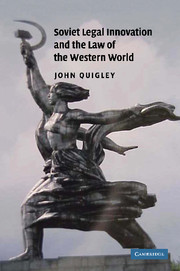Book contents
- Frontmatter
- Contents
- Abbreviations
- Preface
- Acknowledgments
- PART ONE THE SOVIET CHALLENGE
- PART TWO THE WEST ACCOMMODATES
- PART THREE THE BOURGEOIS INTERNATIONAL ORDER
- 16 Equality of Nations
- 17 The End of Colonies
- 18 The Criminality of War
- 19 Protecting Sovereignty
- 20 Military Intervention
- PART FOUR LAW BEYOND THE COLD WAR
- Notes
- Bibliography
- Index
19 - Protecting Sovereignty
Published online by Cambridge University Press: 27 July 2009
- Frontmatter
- Contents
- Abbreviations
- Preface
- Acknowledgments
- PART ONE THE SOVIET CHALLENGE
- PART TWO THE WEST ACCOMMODATES
- PART THREE THE BOURGEOIS INTERNATIONAL ORDER
- 16 Equality of Nations
- 17 The End of Colonies
- 18 The Criminality of War
- 19 Protecting Sovereignty
- 20 Military Intervention
- PART FOUR LAW BEYOND THE COLD WAR
- Notes
- Bibliography
- Index
Summary
As the soviet union came into cold war conflict with the West, it found itself in a minority among the major powers. The Soviet Union was isolated in a world dominated by powers hostile to it. The Soviet government viewed itself as being “encircled” by the capitalists. That situation gave an incentive to insist on defense of sovereignty. In international fora such as the United Nations, this minority posture inclined the Soviet government to seek protection from majoritarian initiatives. The sense of being encircled and the greater physical and political power of the West inclined it to protect its territory from any encroachment. The Soviet government urged doctrines that would ensure against territorial intrusions, both with respect to its own territory and the territory of other states where it vied with the West for influence.
Reservations to multilateral treaties
The Soviet Union's minority position in the United Nations made it a champion of preserving state sovereignty vis-à-vis UN procedures. When the International Court of Justice was set up as part of the United Nations, it was contemplated that most states would submit themselves to mandatory adjudication, so that the Court would become a forum for resolving major disputes between states.
To the Soviet Union, however, the Court was populated by capitalist judges, and hence not a friendly forum. Under the Court's founding statute, a state would be subject to the Court's automatic jurisdiction only if it filed a declaration to that effect.
- Type
- Chapter
- Information
- Soviet Legal Innovation and the Law of the Western World , pp. 158 - 164Publisher: Cambridge University PressPrint publication year: 2007



